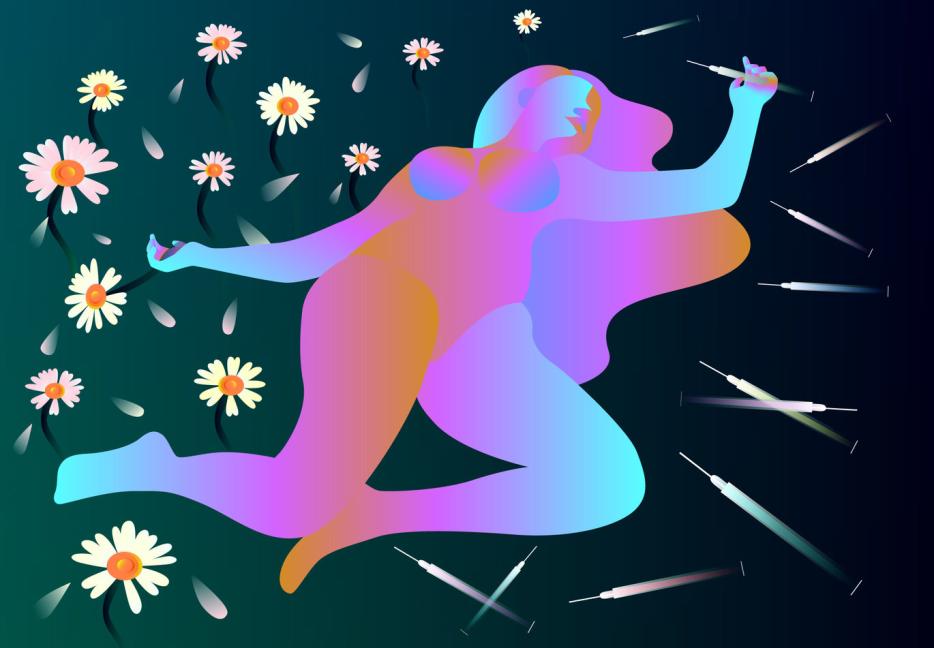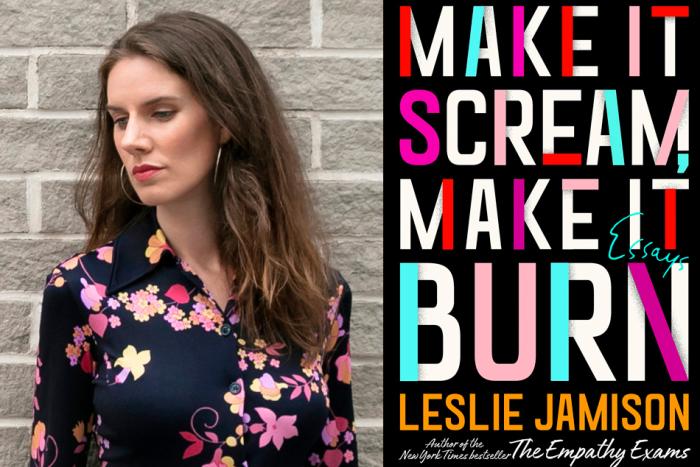There is one particular alley in my city which is policed by a local little person on a scooter named Leticia. She sports a stylish short haircut, heavy makeup, and a shoulder bag with a large handmade pin which reads "I have narcan." She has to reach up above her head to the handlebars of her scooter, and she can dart the thing through traffic with breathtaking agility. I've seen her screaming at a guy to put his dirty needles in a sharps container instead of leaving them out on the sidewalk. Last time we ran into her she asked if we had any gloves. We went into our ambulance and gave her our last box. We figured she'd probably have more field saves than us by the end of the night anyway.
An opiate overdose kills you by first lulling you to sleep and then slowly suppressing your respiratory drive. You breathe ten times a minute, then eight, then four. You turn blue. Your breathing stops, your brain begins to die, and eventually your heart stops pumping.
It looks like a pretty good way to go—until some over-caffeinated paramedic like me stabs you with Narcan and ruins everything. Narcan (generic name: naloxone) is a competitive opioid receptor antagonist, which means that the Narcan floods into you bloodstream and bonks all the heroin off its receptors. This ends both the overdose and the high. So, with a cartoon-zombie exaggeration, quite literally back from the dead, the patient sits up, gasps, cries, sometimes vomits, and almost always looks around with wide, sweaty, who-the-fuck-are-you confusion.
"Good morning!" we say, way too casual. "Welcome back."
***
It's pretty common in my city to have a dose of Narcan drawn up and rubber banded onto the rearview mirror of the ambulance. We keep the rest of our gear all the way in the back of the rig and we run so many overdoses that it's just easier to have the Narcan ready to go. We're lazy that way, I guess.
You remember Epi-pens? You probably knew a kid in your elementary school who had to keep one in his backpack in case he was attacked by a peanut. They make those for Narcan now, and they give them out at clinics and the needle exchange. It's a little plastic device which contains a single dose, quick-release Narcan shot and can be given with little or no training. They're all over the street.
"We gave him Narcan already!" a homeless man shouts as we pull up. "I gave him two of the thingies, the ones they gave us!"
Police carry them, social workers, other drug users. Often a patient will get far more than the recommended dose before we arrive, and we will step carefully through a pile of used heroin needles and Narcan packaging on our way to the patient. I've Narcan'd the same guy twice in a shift. Some days everyone is just dying and coming back left and right like junkie whack-a-mole.
***
Fentanyl is quick, beautiful, and cheap, and it kills you.
What does it mean to drive around with an antidote? It's a strange feeling, knowing that there's an oops button on an overdose. We don't always get there in time. If you're by yourself, or if you took a particularly strong blend, or if your friends suck at calling 911, sometimes you die all the way. But a lot of the time, you die most of the way, and then we pop you full of magic eraser juice, and you come stumbling back from the edge.
There's a range of reactions on waking up. Some patients are upset, some surprised, some nonchalant.
"Oh, I've OD'd a bunch of times."
One patient walks away as soon as we get to the hospital. We pull the gurney out of the back of the ambulance and he casually undoes his seatbelts and gets up. We ask where he's going and he tells us he's going to walk back down the hill and buy another hit. I ask if there's anything I can do to change his mind and he laughs and says no, but maybe you can try again next time.
We bring back a woman wearing matching mittens and a hat who is confused, then starts to cry. She's been using meth every day but has been clean from heroin for 20 years. I arch an eyebrow. She sobs, then screams, then grabs my arm.
"How did this happen? Who did this? I have to know what happened." She repeats herself, panicked, still high on the meth she was probably shooting before she took the dirty dose by mistake. "Where was I? Who did this? How did this happen? I could have died! I could have died?" We try to calm her, but she's so far gone into her own circles that it's difficult to get through. We wake up plenty of overdoses who claim they're clean, but she's so up front about the meth use that I start to believe her story. Once she slows down a little we determine that she shot up what she thought was her usual meth dose and woke up to a team of paramedics pressing a mask to her face and hauling her off the ground into a gurney.
She was going to dose her friend next, the man who called us, and when she realizes that if he had gone first he might have died she starts sobbing again. "It could have been you! If it wasn't me it would have been you! Oh my god, how did this happen?"
We found her lying in a puddle behind a gas station, with a pile of so many scattered needles that we had to pull a sideways one out of her thigh. Here you are, Miss Mittens, at two in the morning, lying in a heroin-riddled alleyway, in a heroin-torn city, in the heroin-soaked night, you've lost half your friends to ODs, and you're tying off your arm and pumping your vein full of some sketchy meth that you bought from who knows where, and you're, what, suprised that things went badly? We could lecture her, or be mean about it. On the other hand, fuck it, you know? It was an honest mistake. She's not taking it out on us, she's just plain scared. I unpackage a disposable blanket and wrap it around her. "I'm so sorry this happened to you. We're going to take really good care of you. Just focus on your breathing, okay? We've got you now."
***
We wake up a guy in his thirties who says, "Shit... Did I OD?" Yeah, man, we gave you Narcan. Welcome back. He sighs, leans his head back, and looks defeated. "I was clean for seven years." He shakes his head. We close the charting computer and talk for a while. He tells us how he got clean, put his life back together, even worked in a drug counseling clinic to help other addicts get off the street. He's a young white guy with a beard, flannel shirt, and torn jeans. He's wearing a T-shirt from a band I like under the flannel. He tells us he hates the failure but he's been slipping lately. His voice is soft but he holds nothing back. A brush with death always brings closeness with it, but to be brought back from a death which was caused by your own greatest personal vice—to have lost your greatest struggle, and then look up from the depths into the eyes of your witnesses, there's nothing left to hide.
"Is there anything, you think, that anyone could do for you? A program, a counselor, a friend? Is there anything that we could do? You seem like someone who could fight this. What would work, do you think, for you?"
He stares at his hands for what seems like a long time.
"No," he says finally. "I don't think there's anything that would help. It's a hell of an addiction."
***
They say heroin is amazing. It's a cheat code. That it's better than any other feeling that you've ever had up until that moment. Everything you've ever tried for, every challenge you've failed or risen to, every struggle and every injury, it all just falls into place. It was all worth it, every minute, every gasp, to bring you here to this moment. It's meditation, it's orgasm.
I'm not a heroin user, but I know what it feels like to search for something and think you've found it. I know that aching, dark emptiness of an addict, and the feeling that one more step, one more grasp, and it's just within reach; that thing you've been hunting for, the thing which has kept you up at night. It's right there, right beyond your fingertips, just stretch a little farther, escape a little more. I can't begin to know the pain of a true opiate addiction, but I have no judgments for those in the struggle.
A lot of people blame the Sackler family for the current American opioid crisis that has swallowed cities like mine; immigrant pharmacists turned CEOs turned opiate drug kingpins, the Sacklers created Oxycontin. Released in 1997, Oxy was stronger, purer, and more addictive than any prescription pain pills that came before it. Its "time-release" formulation made for easy crushing, snorting, and shooting. The soul of the poppy flower wove its way from opium in Turkish smoking dens, morphine for Civil War soldiers, laudanum for menstrual women, the heroin of jazz musicians, and found its home in orange pill bottles across every strata of the American experience.
Purdue Pharma, owned by the Sacklers, marketed the drug so heavily that they were eventually convicted of felony "misbranding." They said it was non-addictive, abuse-proof. (So did the first doctor to inject morphine with a syringe, incidentally; he said the addiction had been caused by eating the drug, but injection was safe.) Purdue bought and sold doctors to over-prescribe the medicine across America, bringing in billions of dollars in profits. Rich and poor, black and white, Purdue Pharma bought lunches and dinners and weekends on yachts for the doctors who prescribed the most pills to the most humans. Reps were given bonuses for getting doctors to prescribe more pills and higher doses.
Long before the Sacklers, before time-release capsules and hydromorphone isomers, the British went to war with China over opium. Europeans wanted Chinese tea and silk and couldn't find enough silver to pay for it all, so traders flooded China with opium from India instead. The addiction spread quickly, the need grew, and soon Southern China began to writhe and cripple under the poppy flower's curse. The Qing dynasty tried to outlaw the drug and stop the influx. The British drug suppliers, with profits burning in their eyes, sent war ships into Chinese ports to blast their way to their opium riches. Two separate wars followed this plotline, only twenty years apart.
Historians still debate the long-term effects of it all, but a thin sticky tar-colored thread runs itself across an ocean and two hundred years. There was a dusky evening, once, in Southern China, say 1842. Gold would be found in California in seven years' time. Maybe it was late spring, maybe the crickets hummed as the nights began to warm for the season. Maybe a shorebird cried out, a wave slapped a wooden dock, a rope sagged heavy with moss against a boat. A man leaned on the rotting wall of a shop front and sucked opium through a pipe. The smoke burned his lungs and filled his head with warm clouds as war raged around him. His life melted, his worries faded, the creases in his worn face relaxed and lay open to the last of the evening light. The money he would pay for this feeling, the unlimited resources that could be torn from his hands to fulfill this need. Men in parliaments would curse and tear up trade agreements, fire would be set to ships, borders re-drawn, before he would give up that dope. There's a diagram to be outlined, somehow, between that tired Chinese pipe and the needle in the sidewalk under my boot. That man, if he could pick himself off the storefront wall, walk a few steps, peer his head through the filmy curtains of time, what would he say to my sidewalk junkies on the downtown streets? My twisted, bleeding twenty-five-year-olds, sleeping on cardboard, scratching at infected sores, poking needles in their battered arms. Would he nod, half-asleep in the fog? Would he pass the pipe?
So I'm driving around the city at one in the morning, seeing street folks wrapped in blankets dancing to a boom box, milk crates full of crack pipes and diapers, scarred arm veins waving up at the city lights, sleeping bags pushed against the forced air heat vents of a sewer grate, and I'm listening to the radio, to politicians and talking heads discussing what to "do" about it, how to "fix" it, with policies and regulations and focus groups, addiction, trauma, law and order, enabling, decriminalization, buzzword after buzzword coming down like rain. And I can't stop reading about the Opium Wars, how humankind found out just how beautiful and deadly this shit was, just how far humans would stretch their misery to fulfill the need for smack.
I've had a lot of non-medical folk ask me about fentanyl lately. What's it like? It's awful, isn't it? They should do something about it, and right away! Well, sure, I guess. Who's they? I love that you're sitting at a mahogany table on the thirty-fourth floor trying to double-click a solution out on your laptop, I love the effort, I really do, but I'm watching Leticia the scooter mayor wearing the gloves we gave her dig through her purse and the ghost behind her plunge the needle into his vein and lean his head back and exhale, just close his eyes and breathe the syrup into his blood and give a little shiver and his whole world gets soft and you're up in your apartment and I know you can hear the sirens but we look like ants from where you are.





